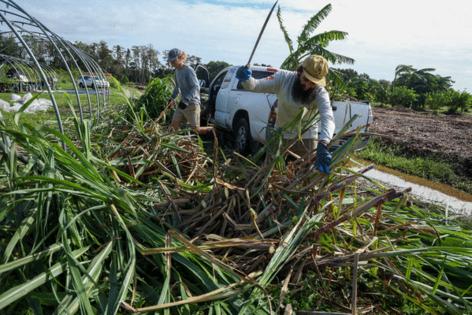Orlando-area farms rocked by Hurricane Milton work to recover
Published in Weather News
ORLANDO, Fla. — Mike Garcia’s boots sank into the earth as he walked the drowned fields of Orlando’s Everoak Farm in the wake of Hurricane Milton’s violent visit. The urban oasis off Carrington Road just outside the Baldwin Park neighborhood has been serving the city for five-and-a-half years. He’s been market farming for longer than that. This isn’t his first extreme-weather rodeo. But it still hurts.
The small team protected whatever they could ahead of the storm, packing movable plants, nursery pots and trays into the barn, along with the young chickens that were just about ready to go out on pasture. All survived, no problem.
“But, when it comes to the stuff in the field, everything that’s planted,” he says, “it is what it is. At Mother Nature’s mercy.”
And Mother Nature showed little mercy, if any.
“Everything out there is pretty much flooded or got severe wind damage,” he says.
Perennials, like bananas, papayas and sugarcane, lay everywhere, but this was expected. Garcia will cut much of it back at the base, and it will regrow.
“It’s the annuals, the stuff we really value most — tomatoes, basil, peppers, eggplant, basil, turnips, radishes — that got hammered … beat to hell.”
Items like these have a tough time bouncing back. Garcia will wait for the field to dry up for a true assessment, but he knows most won’t make it.
It’s something he says all Florida farmers have to deal with. And it will set them back in time and money and the ability to deliver.
Out at Zellwood’s Long & Scott Farms, owner Hank Scott says 300 acres of pickle cucumbers took on a foot and a half of rain during Milton’s assault.
How many pickles is that?
Long & Scott not only supplies locals with the crisp, thin-skinned cukes, but the farm also supplies huge processing companies like Claussen with the cucumbers that wind up in their jars.
Scott chuckles, amusement with just a touch of bitterness.
“Ohhh, that’s a pile of ’em.”
Long & Scott’s famous Zellwood sweet corn, 20 acres of it, has been blown over. Hard.
“It’s leaning real bad, but usually, the sun’ll help stand that back up. Plus, we’ve got the corn maze that we do every year, Tuesday through Sunday. That’s leaning, too.”
On Thursday, Scott was hopeful, but by Friday, it was clear the family fun would remain on hold.
“That’s gonna be a huge loss for us this weekend,” he said.
Scott’s large farm doesn’t do CSA [community supported agriculture] subscriptions, but for Garcia’s Everoak and Mason Kuehn at Winter Park Urban Farm, these are a big part of business, in particular, says Kuehn, the customers who pay ahead of time, in full or two-installment setups.
It’s pricy up front — Winter Park Urban Farm CSA subscriptions run from $800 to $1,580 — but the value is there for those who can make the investment.
“It’s actually one of the less expensive ones,” says Kuehn. “[The $800 option] runs for 34 weeks, so the price is about $23 a week.]”
Kuehn’s crops, much of their plots flanked by large oak trees, were devastated by Milton.
“I get a lot of ‘downs,’ twigs and stuff. You get actual cuts in the leaves of the greens, which is pretty much like an open wound in a person,” he says.
Other produce, flooded out, won’t make it.
“A lot of your roots are going to start to rot, and then the soil goes anaerobic,” he explains. “The lack of oxygen, because it’s so wet, begins to populate pathogenic microorganisms and different plant diseases.”
Outside larger investments, though, locals can support all three farms and others simply by showing up at the farmer’s markets.
Long & Scott may take a while to get theirs online. As of Friday, the power was still out. Scott was running a generator to keep harvested cucumber bins safe from spoiling.
“The farmer’s market had about a foot of water in it, and it’s pretty nasty,” he said. “It’s going to take a lot to clean up.”
But when the market’s up and running (check social media for updates), “people can come and buy some Zellwood sweet corn and okra and pickle cucumbers.” And grab tickets for the maze for when it reopens later in the season.
Everoak won’t have much at their farm stand when it opens, as planned, on Oct. 19, but Garcia says home gardeners can check out the plant starts, a segment of the business they’ve been growing. They’ll also have honey — Garcia’s bees suffered one toppled hive but were otherwise unscathed in the storm —along with prepared foods like green papaya kimchi.
Following through with the CSA subscriptions, including the one for their restaurant client, Kaya, is of utmost importance. He knows that once the harvest is rolling again, thinner weekly baskets (and what’s available on the a la carte stand weekly) will be well made up for.
Winter Park Urban Farm sells its wares weekly at the Winter Park Farmer’s Market (8 a.m.-1 p.m. Saturdays) and Audubon Park Community Market (Monday nights in front of Stardust Video & Coffee in Orlando’s Audubon Park Garden District). Kuehn will keep the community notified on Instagram (instagram.com/wpurbanfarm), he says, but it’ll be at least a couple of weeks, possibly more, before he’s harvesting again.
Garcia estimates his own setback at six to eight weeks. With late-season storms becoming more common, he’s seriously considering shifting his season, planting a little later and extending it longer into early summer.
At the end of the day, he says, he’s used to it. Hurricanes are the worst actors of all in the long list of Florida farming challenges.
“I think most of us understand what happens this time of year, that planting early is something of a gamble.”
©2024 Orlando Sentinel. Visit orlandosentinel.com. Distributed by Tribune Content Agency, LLC.







Comments